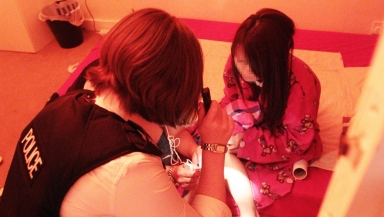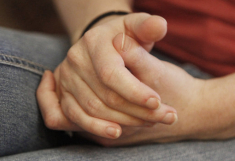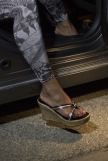
The landscape of prostitution in the UK is changing. Ten years ago, you'd find women on street corners at certain times of day.
Now, they tend to operate from brothels, saunas, massage parlours and hotels.
The use of internet and mobile technology, increasing stigmatisation of men wanting to pay for sex, a change in national legislation and also the consequences of human trafficking, all mean that the patterns of prostitutions are shifting.
Mark Wakeling, director of UK charity Beyond the Streets, says this shift from on-street to off-street locations means those working to support women in the sex industry have had to re-think their approaches. His charity has partnered with The Gate, a local charity in Southampton, to work out a new way to reach women.
"The Gate's experience and history of supporting women locally on-street and Beyond the Streets' experience in setting up projects and previous experience of supporting women nationally means that together we are well positioned to lead the way in providing outreach to women working indoors," said a statement about the partnership.
"Research suggests that many women who sell from brothels and massage parlours are isolated and feel unable to access support. Attitudes from the police and local residents can often compound this isolation making it difficult for women to locate services they might need; services like access to contraception, support with going to court or Rape Crisis and someone to talk to.
"Violence against women in these situations remains high; one study suggested that 48 per cent of women surveyed who worked indoors have experienced violence from men who have purchased sex from them. Another study states that three-quarters of 125 women surveyed in 5 cities had experienced physical violence, mostly from clients," the statement continues.
"Our research highlights 26 massage parlours and 260 independent escorts in central Southampton over a specific period of time. The numbers are significant and demonstrate a national trend."
These figures have impelled Wakeling and his team to explore the practical response to prostitution, and how best to support women trapped in cycles of sexual exploitation. "We've very much done a lot of research so far; looking at the size of the issue and the locations here in Southampton. We're now moving into the consultation phrase with women; meeting with them and finding out the needs," he says.
"There are greater numbers working off-street now, and there aren't tailored support services for those women. The question of how we need to adjust the way we tackle it is something we're talking to chaplaincy services about. We're going into clubs and sexual health clinics, but it will require different models in different areas," he adds.
Though the Off Street project is currently Southampton based, Wakeling is hopeful that it will eventually be rolled out nationwide. "We need to look at what's happening across the country, learn from it and get better resourced," he says. As for whether we will see an end to prostitution in our lifetime, Wakeling is hopeful – though he admits there's a long way to go.
"I'd like to say yes, but I think it's unlikely. There's always going to be a vulnerability created through the sale of sex, so it's unlikely to be a thing which is eradicated. What we can do, though, is try to reduce the harm and the resulting violence which women in prostitution often experience," he says.
"Off the Street outreach will reduce women's isolation, increase their protection and links with the police. It will connect women to vital support services and essential information on how to find alternatives. This way women will be able to access a 'space for action' and routes out become more apparent," the charity says.
"In the end, more women will be able to pursue genuine alternatives to prostitution and realise their dreams and potential, which not only affects them but their families."
For more information on Beyond the Streets, click here.















